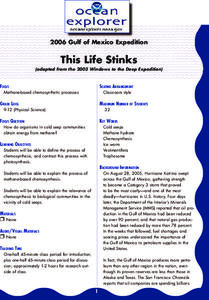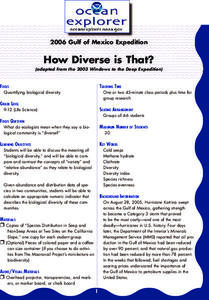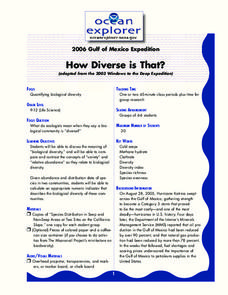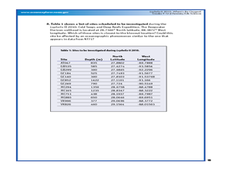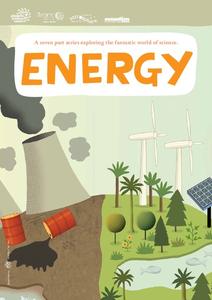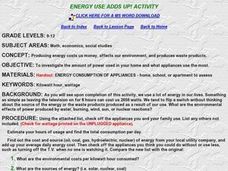American Museum of Natural History
Climate Change
It actually is possible to have too much of a good thing when it comes to climate change. A slide show lesson describes how burning fossil fuels contributes to climate change. Individuals read about the scientific process and the...
American Museum of Natural History
What is the Greenhouse Effect?
Without the greenhouse effect, Earth would not be inhabitable. A thorough online resource describes the greenhouse effect and how it occurs. The source highlights the different types of gases that work together to absorb the sun's...
Curated OER
CSI on the Deep Reef
After some instruction, small groups prepare a written report on chemotrophic organisms. Though not clearly mentioned, this resource would work best if groups have the Internet available to research the vocabulary and different organisms...
Curated OER
This Life Stinks
Chemosynthetic communities of cold seep areas are considered in this lesson. Working in collaborative groups, marine biology or oceanography learners research and prepare a report about oxidation-reduction reactions involved with...
Curated OER
How Diverse is That?
After reviewing biodiversity, learners work in small groups to analyze actual species distribution data. They learn to calculate the Shannon-Weaver diversity index for different communities. Though not particularly engaging, the content...
Curated OER
CSI on the Deep Reef
Students read about, discuss, and research chemotrophic organisms. For this chemosynthesis lesson, students discuss the differences between photosynthesis and chemosynthesis. They learn that chemosynthesis includes a variety of chemical...
Curated OER
How Diverse is That?
Students discuss biological diversity in ocean communities. In this diversity instructional activity, students examine the variety of organisms compared to relative abundance. They will write an analysis and discuss their findings with...
Curated OER
Sustainable Marine Fisheries
Through a fishing simulation, environmentalists discover consequences of over fishing. Afterward, they discuss how the activity relates to the impact of real-life commercial fishing. They also consider sustainability in the fishing...
Curated OER
This Life Stinks
Learners study how organisms that live in cold seep communities get energy from methane. In this organism lesson students write a brief report and identify oxidation reduction reactions and explain if these are dependent of...
Curated OER
Where's the Oxygen?
Young scholars study seawater and how temperature and salinity influence it. In this oxygen lesson students complete a lab activity on dissolved oxygen.
Curated OER
Life is Weird
Students describe features of cold seep communities and list organisms that can be found in these communities. In this exploratory lesson students complete an activity and describe the process of chemosynthesis.
Curated OER
Giants of the Protozoa
Students describe and define xenophyophores. In this protozoa lesson students divide into groups and complete a lab activity.
Memorial Art Gallery
Learning to Look, Looking to Learn - Peeling Onions
Lilly Martin Spencer's "Peeling Onions" is the subject of a series of exercises that model for learners how to use the elements of art to read a painting. A series of worksheets focus viewers' attention on how Spencer uses color and...
Curated OER
Energy
In this science worksheet, students learn about renewable, non-renewable and sustainable energy and examine alternative fuel sources by studying the information on these 8 pages. Students complete 20 questions about energy. These pages...
Curated OER
The Road to World War II
Students research the orgins and early events of World War II using online and off line resources. They conduct an interview with a local World War II veteral and present their findings to the class.
Curated OER
Lesson Six
Students investigate the importance of ocean resources and what humans need to do to maintain a healthy ocean. In this oceans lesson plan students participate in an activity after viewing a PowerPoint presentation on the Earth's Waters.
Curated OER
The Future of the Arctic National Wildlife Refuge
Students research the governments role is preserving the Arctic National Wildlife Refuge. They discuss the proponents and the opponents side of the issue.
Curated OER
ENERGY USE ADDS UP!
Young scholars investigate the amount of power used in your home and what appliances use the most. They analyze the concept that producing energy costs us money, affects our environment and produces waste products. Students come up with...
Curated OER
Engineering Activity
In this engineering worksheet, students research engineering and fill in blanks to complete sentences. A reference web site is given.
Curated OER
Mesozoic Era in Arkansas
Eighth graders study the geology of Arkansas from 225 million years ago to 65 million years ago. They discover they types of strata laid down by the Gulf of Mexico. They examine the economic importance to the community.
Curated OER
CO Buildup City
Students conduct a controlled experiment. They collect data in an organized manner. Students analyze data to reach a conclusion and communicate findings. They explain how city size, temperature, and pollution is related to the air quality.





